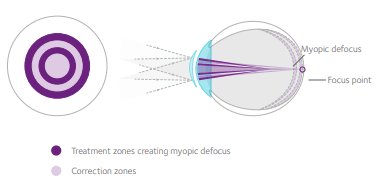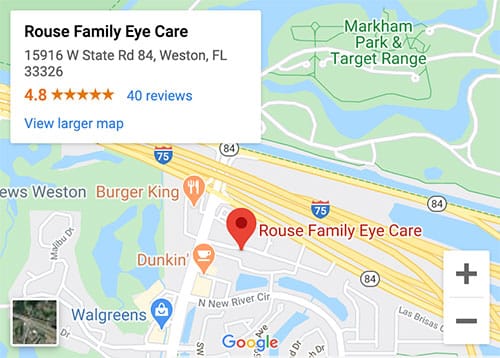What is Myopia control?
Myopia control is a group of methods eye doctors can use to slow the progression of childhood myopia. There is no cure for myopia, but there are ways to help control how rapidly it develops and progresses. These include myopia control contact lenses, atropine eye drops and lifestyle changes.
Why should you be interested in myopia control? Because slowing myopia progression may keep your child from developing high myopia. High myopia can lead to sight-threatening problems later in life, such as:
- Myopic macular degeneration
- Cataracts
- Primary open-angle glaucoma
- Retinal detachment
How is myopia control done?
The most common cause of childhood myopia and its progression is axial elongation of the eye. This is when the eyeball grows too long from front to back. In general, myopia control works by slowing this elongation.

There are several types of effective myopia control managements, and they can be used one at a time or in combination.
- Myopia Control Lenses
- Myopia Control Eye Drops
- Lifestyle Modification
After an in-depth comprehensive eye examination, we develop a treatment regimen for your child based on their specific needs.
Our practice is proud to be certified and trained in all options for myopia control management.
MYOPIA CONTROL CONTACT LENSES
There are two types of FDA approved contact lenses for myopia control, MiSight and Abiliti.
MiSight Contact Lens
MiSight 1 Day: The MiSight lens is the first FDA-approved soft contact to slow the progression of myopia in children, aged 8-12 at the initiation of treatment.
Children insert this single use soft contact lens in their eyes in the morning and wear them for at least 10 hours/day then dispose of them in the evening. The lenses provide clear vision while wearing them with the added benefit of slowing the progression of the myopia.
Studies have shown a slowing of the progression of myopia by 59% and the rate of elongation of the eye by 52% versus a control group after 3 years using the MiSight lens.
How do they work?
MiSight® 1 day is an award-winning2,3,4 dual-focus soft contact lens that uses ActivControl™ Technology to slow the elongation of the eyeball1. The ActivControl™ Technology in MiSight® 1 day utilizes an optic zone concentric ring design with alternating vision correction and treatment zones. Two zones are vision correction zones with the label power of the contact lens, and the alternating two zones are treatment zones with 2 diopters of defocus to slow the progression of myopia. This design allows the child to see clearly while benefiting from the treatment effect.

Clinically Proven Data
CooperVision undertook a rigorous, multi-year, multi-country study to track how the MiSight® 1 day contact lens affected myopia progression in children aged 8–12 at the initiation of treatment5. After three years, the study concluded the lens effectively slowed myopia progression by 59% and slowed the rate at which the eye lengthens by 52% compared to children in the control group wearing a single-vision 1-day lens.5 Results presented after the five-year mark continued to demonstrate safety and efficacy.
Ease of Fitting, Wear, and Care
Incorporating this technology into a 1-day disposable lens was based on the safety profile of lenses that are discarded after one day of use, as well as children’s ease of use and parental peace of mind. For children and parents, a multi-center study found:

Contact lens insertion video
https://www.youtube.com/watch?v=ePNH6T4SWtk
Contact lens removal video
https://www.youtube.com/watch?v=l8VGH0s7yBQ
Abiliti Orthokeratology Contact Lens
https://rede1.app.box.com/s/y4jczdc2wbjnda8k3a6ji7nsmq1zfpfa
What are Abiliti™ Overnight lenses?
Abiliti™ Overnight lenses are FDA-approved orthokeratology (ortho-k) contact lenses for myopia management. These lenses provide clear vision during the day without the need for glasses or other contact lenses.
How do they work?
Abiliti™ Overnight lenses temporarily reshape the cornea when worn to bed every night. After removing the lenses in the morning, wearers can enjoy clear vision the entire day without the need for glasses or other contact lenses. Abiliti™ Overnight lenses are specifically designed and fitted to match a patient’s eye based on its unique corneal shape and prescription.6
Are they safe to use?
Ortho-k lenses have been successfully used for managing myopia in thousands of children and adults for over 15 years.6 Clinical studies have demonstrated that Abiliti™ Overnight lenses are a safe and effective option to manage myopia.7 In three studies accounting for over 200 patient‐years of wear, no serious adverse events were found with Abiliti™ Overnight lenses.8
What are the benefits of Abiliti™ Overnight lenses?
Children wearing Abiliti™ Overnight lenses report better rates of overall vision, far distance vision, symptoms, appearance, satisfaction, academic performance, handling and peer perceptions than children wearing single‐vision spectacles. †8 When worn overnight, patients who use Abiliti™ Overnight lenses typically may participate in sports and other activities with clear vision without the need to wear glasses during the day.
Who can wear Abiliti™ Overnight lenses?
Children as young as 6 years old and adults who are assessed with myopia up to 4.00D may be fitted with ACUVUE® Abiliti™ Overnight lenses.8 Additionally, patients with refractive astigmatism of up to 1.50D may be fitted with ACUVUE® Abiliti™ lenses for astigmatism.
MYOPIA CONTROL EYE DROPS
A low dose of atropine eye drops instilled in both eyes at bedtime has been shown in multiple studies to slow the progression of axial myopia (the lengthening of the eyeball) in children.
Lower concentrations of atropine, such as those used in children for myopia control, have been shown to affect pupil size and up-close vision only a small amount. Atropine drops of lower concentrations are delivered to your home from a compounding pharmacy.
The prescription that your child needs to see clearly will usually remain the same. Atropine drops for myopia control are usually instilled at bedtime so daytime contact lens wear is safe.
Although low dosage atropine should not significantly affect your child’s ability to see up close, reading glasses can be used if needed. Sunglasses can be worn outdoors if light sensitivity becomes an issue.
LIFESTYLE MODIFICATIONS
Make sure your child spends more time outdoors. Limit screen time on computers or other digital devices. By balancing screen time with outdoor time, you may help limit your child’s myopia and protect their vision as they grow older.
Researchers in the Collaborative Longitudinal Evaluation of Ethnicity and Refractive Error (CLEERE) study which followed eye development of more than 1,200 children, ages 6 to 14, found that children who spent more time outdoors had a smaller chance of becoming nearsighted.
Projections suggest that almost 50 percent of the world will be myopic by 2050.
Although genetics play a role in myopia, the sudden global increase in myopia points to environmental factors. Several studies have shown a link between near work and myopia in children.
The American Academy of Pediatrics (AAP) recommends children and young people ages 5-17 years should have less than 2 hours of sedentary recreational screen time per day. This does not include schoolwork. The AAP also recommends a minimum of 1 hour of outdoor physical activity per day.

954-384-6200
